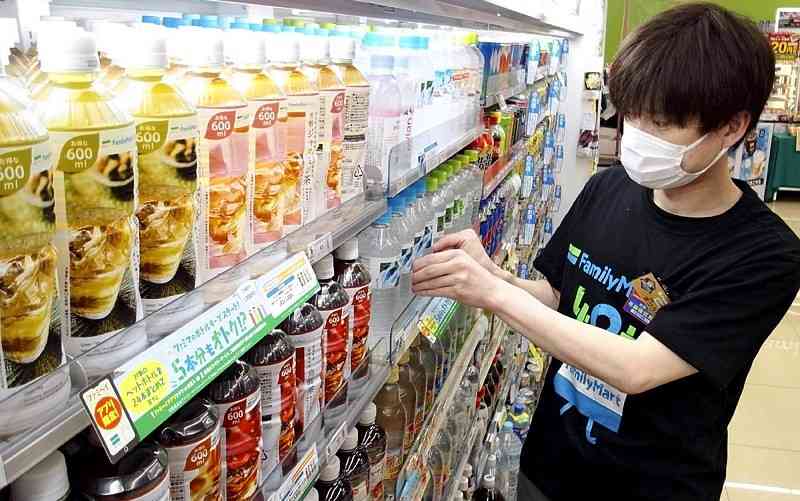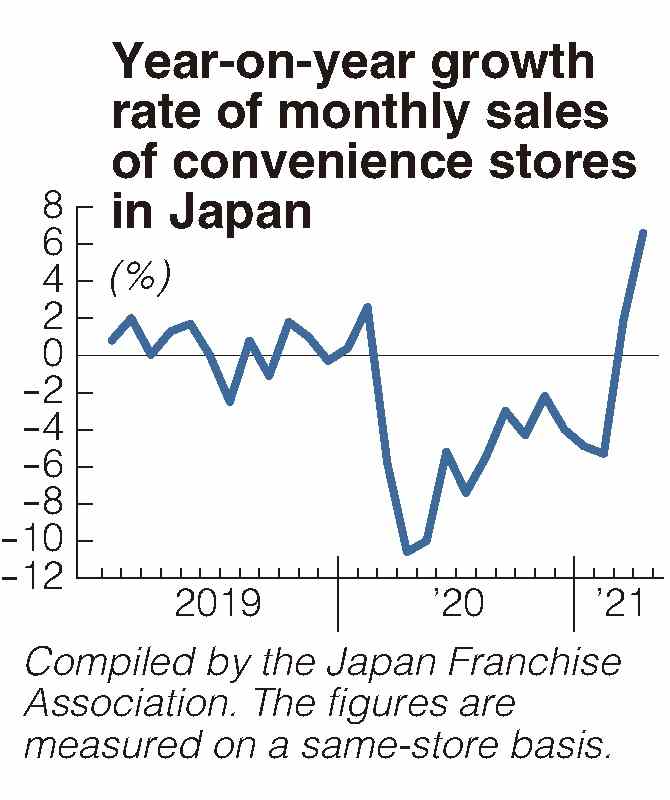
Bottled drinks seen at a FamilyMart store in Minato Ward, Tokyo, on May 26
13:28 JST, June 6, 2021

Major convenience store operators have rolled out new products and services amid the prolonged pandemic hoping to cater to customers’ changing needs as they stay home more.
FamilyMart Co. began selling T-shirts, underwear and the like under the brand “Convenience Wear” at its stores across the nation in March.
Conventionally, the main customers purchasing underclothes at convenience stores have been business travelers and those on vacation.
However, the company launched the new brand with a special focus on comfort to address demand for such wear as people spend longer time at home.
The products are also being promoted as ecologically friendly as they use fibers made from old clothes and fabric scraps.
In March, the company started a “bottle keep” service for bottled drinks. Customers who use the service can buy in advance 24 bottles of water or tea in 600 ml plastic bottles via the company’s smartphone app and then pick them up whenever they want at any store across the nation.
The service is offered at the discounted price — it costs ¥1900 when it normally should cost ¥2400, with tax. As a bottled tea or water is ¥100 each, customers get 24 bottles for the money worth 19 bottles.
FamilyMart hope the service will provide more opportunities for customers to stop by stores in office districts, where customer traffic is declining, and encourage them to buy other products as well.
In late March, Lawson, Inc. released “stick onigiri,” a handheld rice food similar to norimaki rice rolls. Its unconventional shape allows consumers to taste the filling from the first bite. People can also eat it without getting their hands dirty as it can be eaten while still wrapped in the package.
To meet demand for takeout, the company is also expanding food items cooked at its stores, with plans to increase stores offering freshly prepared boxed meals from 6,400 as of the end of February to 10,000 by fiscal 2022.
Seven-Eleven Japan Co., the largest convenience store chain in the nation, is now focusing on meal kits such as cut vegetables so consumers can easily prepare food at home. The food products are available to registered customers and can be purchased by placing an order online, then picking them up at a store or have them delivered home.
Many convenience store sales in April almost recovered to pre-pandemic levels on a same-store basis.
In addition to so-called social-distancing fatigue from staying home, strong sales of alcoholic beverages and long-life frozen foods are providing a tailwind.
“Developing products that will motivate customers to visit stores will be increasingly important as consumption behaviors are changing,” said Yutaka Suzuki, a senior researcher at the Distribution Economics Institute of Japan.
Top Articles in Society
-

Producer Behind Pop Group XG Arrested for Cocaine Possession
-

Man Infected with Measles Reportedly Dined at Restaurant in Tokyo Station
-

Woman with Measles Visited Hospital in Tokyo Multiple Times Before Being Diagnosed with Disease
-

Bus Carrying 40 Passengers Catches Fire on Chuo Expressway; All Evacuate Safely
-

Tokyo Skytree’s Elevator Stops, Trapping 20 People; All Rescued (Update 1)
JN ACCESS RANKING
-

Producer Behind Pop Group XG Arrested for Cocaine Possession
-

Japan PM Takaichi’s Cabinet Resigns en Masse
-

Man Infected with Measles Reportedly Dined at Restaurant in Tokyo Station
-

Israeli Ambassador to Japan Speaks about Japan’s Role in the Reconstruction of Gaza
-

Videos Plagiarized, Reposted with False Subtitles Claiming ‘Ryukyu Belongs to China’; Anti-China False Information Also Posted in Japan



























